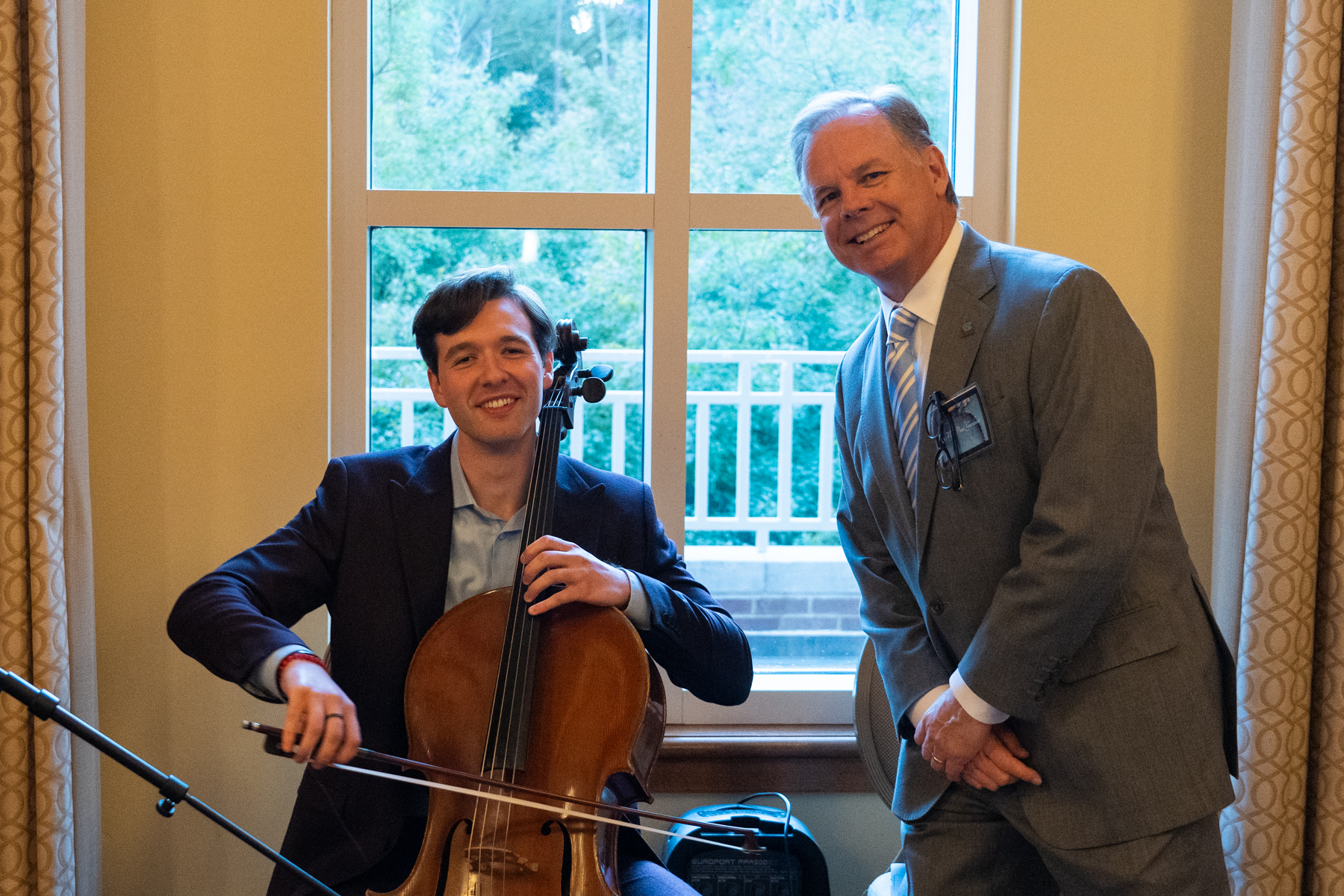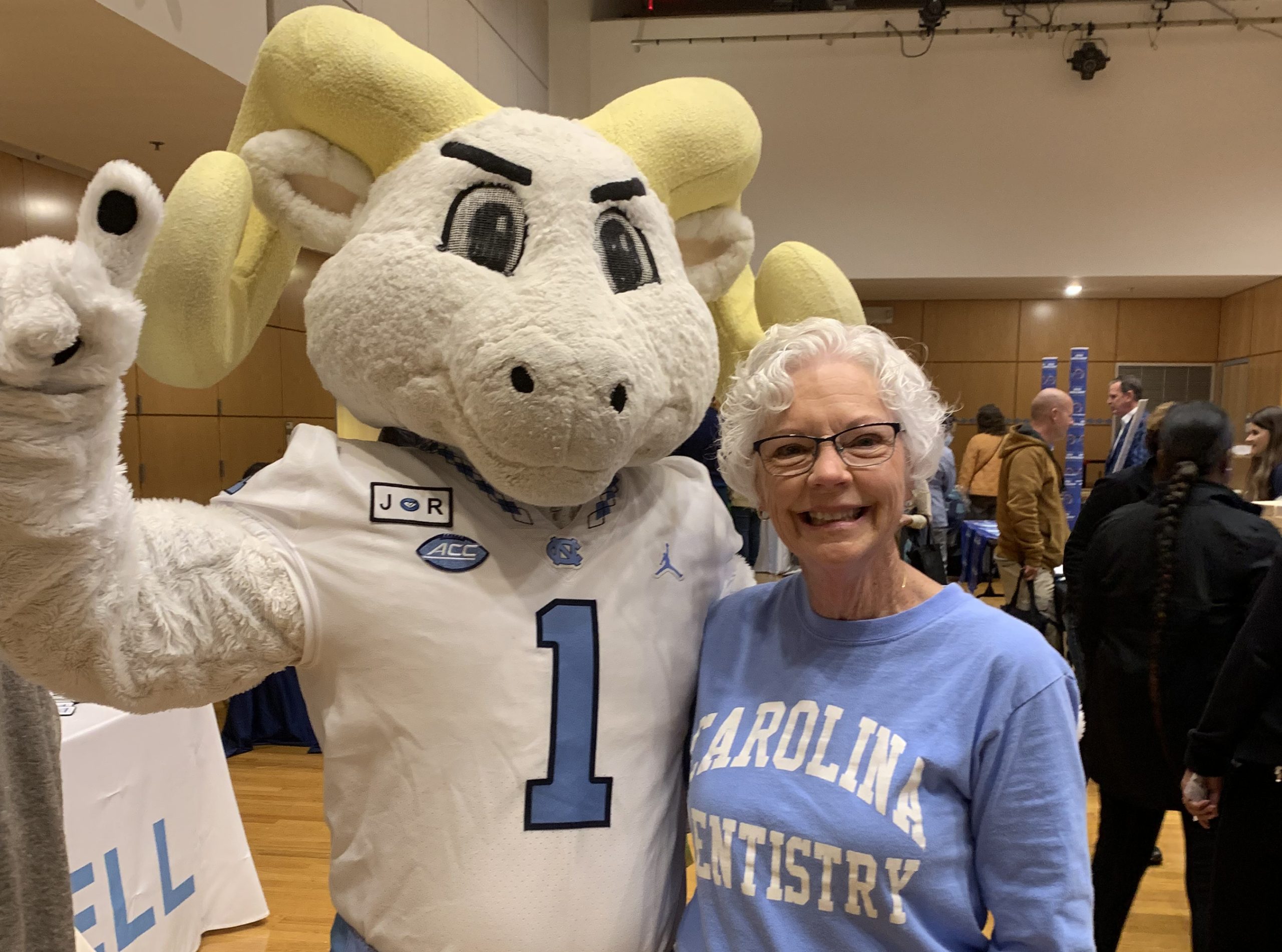Moeser’s Commencement Address
James Moeser is Chancellor Emeritus of the University of North Carolina at Chapel Hill, Professor of Music, and Senior Consultant for Special Initiatives at the UNC Institute for Arts and Humanities. As chancellor from 2000 to 2008, he articulated the vision that UNC should be America’s leading public university.
Early in his tenure, Moeser was a champion of academic freedom, defending the University from attacks against books chosen for first-year reading assignments in two successive years. In 2003, the Carolina Covenant, a program to provide a debt-free education to students from low income families, became a national model for improving access to higher education. The $2.4 billion Carolina First Campaign, the largest private fund-raising drive by any university in the South, and the fifth largest in U.S. history, created 208 new endowed professorships, and 1,350 scholarships and fellowships.
The Carolina campus underwent a major transformation during his tenure, with over 6,000,000 new square feet of buildings in a $2.2 billion construction program. He supported critical investments in scientific research to move UNC to the very top echelon of U.S. research universities. An early investment in genome research, for example, paved the way for UNC to become one of the major centers of cancer research in the world.
Carolina experienced a renaissance of the arts during his administration. After the renovation of Memorial Hall, he created the Carolina Performing Arts program, which has transformed the cultural life of the entire region.
Since leaving the Chancellor’s Office, Moeser has returned to his roots as a musician. Once a well-known concert organist, Moeser is now able to practice daily. He teaches as first-year seminar in the arts, focusing on the Carolina Performing Arts series.
His honors include the 2007 American Council on Education’s Reginald Wilson Diversity Leadership Award, a lifetime achievement honor that recognizes major advancements to diversity in higher education; election to the American Academy of Arts and Sciences in 2007; and an honorary Doctor of Letters degree from Duke University in 2009.
Thank you for the invitation to address the 2012 graduating class of the UNC School of Dentistry.
Susan and I have strong personal reasons for appreciating the School of Dentistry, for both of us are patients of Dr. Al Wilder in the Dental Faculty Practice.
As you know, the School of Dentistry has long been one of Carolina’s gems, consistently ranked among the top five dental schools in the U. S. In the most recent U. S. News and World Reportrankings of U. S. dental schools, we rank second. In federal research funding, we are currently sixth, but with the completion of the new Koury Oral Health Sciences Building, which almost doubles the footprint of our existing facilities for research and teaching, we will see a major expansion of our research funding as well as increased enrollment. This was the last capital project that I worked on as chancellor, and I am very proud of it. The School of Dentistry now has almost 10 acres of space, the equivalent of 10 football fields.
I am proud of these facilities, but I am even prouder of this great faculty and this great group of graduates. Especially, I want to acknowledge the work of Dental SHAC – the Student Health Action Coalition – administered by our third-year students, which provides dental care for low income residents of Orange County. This is one of the oldest student-run dental clinics in the country, one that provides great clinical care for those who otherwise would not have access to it. Dental SHAC is an expression of Carolina’s core values.
Commencement speeches should begin with a note of humor. At this point, I made a promise to myself – that I would not tell a single dentist joke. No doubt, you have heard them all, and you must be as sick of them as lawyers are of lawyer jokes.
My field is music, and we do have a particular genre of jokes that are peculiar to music schools, and only to music schools. We tell viola jokes. The viola, for those of you who are not connoisseurs of symphonic music, is the alto in the string chorus, slightly larger than the violin, in third place after the first and second violins, almost never a soloist.
I’ll give you a few examples, so that we can cover the humor requirement.
How do you keep your violin from getting stolen?
Put it in a viola case.
What’s the difference between a violin and a viola?
- The viola burns longer.
- The viola holds more beer.
- You can tune the violin.
What’s the difference between a viola and a trampoline?
You take your shoes off to jump on a trampoline.
Why do violists stand for long periods outside people’s houses?
They can’t find the key and they don’t know when to come in.
Okay. You get the idea.
Now, I want to say something serious. I want to think about the future and the world you are about to step into. I want you to try to project yourselves 50 years into the future, into the world of 2062.
Fifty years seems like a long time, and it is. For me, 50 years ago seems like only yesterday, when I was just beginning my academic career. I have seen enormous change in 50 years. But you will see more. Much more. Information equivalent to the entire Library of Congress is now generated every 15 minutes. Progress accelerates exponentially with the rate doubling every decade.
As one of his last projects, the late CBS newsman, Mike Wallace, asked some of the world’s most accomplished people to speculate about the future in a book called Fifty Years from Today. As I leafed through this book, I was struck by the fact that some of things being predicted were directly contradicted by others, reminding me of Yogi Berra’s famous aphorism, “It’s tough to make predictions, especially about the future.” Some of these forecasts predict a world of wondrous technology. Others predict a world spinning out of control, with unchecked population growth with insufficient natural resources to support that population.
So what will your world look like in 2062? You will be well into your seventies, but many of you will still be working, partly because you can, due to good health, and partly because you will have many opportunities. You will also be needed. The Census Bureau forecasts that the population of working-age adults will be smaller than it was during World War II because of declining birth rates. You may very well be doing something quite different professionally, however. People with good, broad educations will have the greatest options for changing jobs and recasting their careers.
Many of you will live well into your 100s because you are highly educated, and because you are likely to continue to eat well, exercise, and have access to quality health care. Whereas human life expectancy has doubled over the past two centuries, the rate of increase will soon go into high gear. In about 15 years, according to one model run at MIT, every 12 months we’ll be adding more than a year to life expectancy.
Unfortunately, this increase will not apply to the poor and less well-educated, who are more likely to be obese and to have diabetes. They will have shorter life expectancy. That is the bad news. And this increase in life expectancy and world population is not necessarily good news either, because we may have seriously depleted the resources of our world to support that population.
Some see a world with greater conflict between the haves and have-nots, large cities, crushed by overcrowding, degenerated into jungles of crime and violence; a world still threatened by a potential nuclear powder keg.
Francis Collins, the Director of the NIH who led the Human Genome Project (and a UNC alumnus, by the way) is confident that in 50 years each of us will have a copy of our own complete DNA sequence, incorporated into a highly accurate electronic medical record and accessible from anywhere in the world. “Barring deaths from trauma, the average normal life span will reach triple digits. But immortality will not be in reach: the death rate will still be one per person,” he says.
These advances in medicine and health sciences will lead not only to great advances, but to ethical and moral dilemmas that will make our current controversies about abortion and stem cell research pale by comparison. We will have mastered the art of re-engineering plants. That will be our solution to population growth and water scarcity. What about genetically engineered human beings? Some of these futurists speculate on a world where nearly all of the life-threatening diseases have been overcome, opening up a world in which the focus is on personal accessories – people replacing their own retinas with artificial ones. I’m not sure what the implications are for dentistry in this brave new world, but I think we can be sure that it will affect dentistry every bit as much as ophthalmology.
Regardless of which of these competing visions we want to believe, there is little question that 50 years from now, while we in the developed world enjoy these miracles of science and innovation, billions of others will still live and die in poverty and crime. I am pretty sure of this. This is the sobering truth about the future.
The simple fact is that you, class of 2012, have it in your hands to affect the course of human nature so that our future will not be simply a projection of our present. You will shape the future, for good or ill, by the choices you make. Each of you. One person at a time.
Marian Wright Edelman, the founder and president of the Children’s Defense Fund, makes a compelling argument that we must have a fundamental change-of-course for the United States to be a more just society 50 years from now. She writes, “Despite unprecedented material wealth in the United States, we allow nearly 13 million children to live in poverty and 9 million to go without health insurance. The majority of these children live in working families. The U.S. leads the world in health technology but lags behind most of the industrialized world in infant mortality and low birth-weight rates, children killed by guns, and the gap between rich and poor.
“How do we build the spiritual and political will to use our extraordinary resources to shape a more just society?” she asks. “How do we change the unbearable dissonance between promise and performance; between good politics and good policy; between professed and practiced human and family values; between racial and religious creed and racial and religious deed; between calls for community and rampant individualism and greed; and our capacity to prevent and alleviate human deprivation and disease and our political and spiritual will to do so?
“We must reset our moral compass,” she says, “if we are to build a world fit for our children over the next 50 years and if humankind is to progress rather than regress.”
We have the knowledge. Do we have the will?
My hope for you today is that you leave Carolina with more than the science of your craft. I hope that this university has imparted to you some of her values as a servant of society – that you feel a responsibility to be a part of the necessary course change if we are to be a more civil, more just, a more compassionate society.
In 2005, Steve Jobs gave the commencement address at Stanford. He was in remission from the cancer that had been diagnosed only a year earlier, and while he was again in good health, he was acutely conscious of his own mortality. That was the context for these words to the Stanford graduates: “Your time is limited, so don’t waste it living someone else’s life. Don’t be trapped by dogma – which is living with the results of other people’s thinking. Don’t let the noise of others’ opinions drown out your own inner voice. And most importantly, have the courage to follow your heart and intuition. They somehow already know what you truly want to become. Everything else is secondary.”
I can’t say it better than that. Follow your heart. And never, ever give up.


